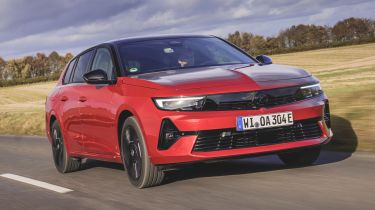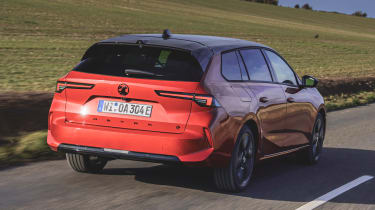New Vauxhall Astra Sports Tourer Electric 2023 review: a refined and practical EV
The new all-electric Vauxhall Astra Sports Tourer estate comes with space to spare

Verdict
As it stands, the Vauxhall Astra Sports Tourer is one of only a handful of electric estates on sale. While it’s pricier than an MG5, it’s a more convincing load lugger and better to drive. Alongside its Peugeot sibling, it’s the best family estate car in an admittedly small market, but strong PCP deals make the Astra an attractive proposition. If you want a practical EV that isn’t an SUV, this is the car for you.
While there has been a huge influx of electric SUVs, options in the estate car segment are still thin on the ground. At the sensible end of the market, there’s the MG5, but it’s only an estate in name – the boot isn’t a practical shape and it can only carry slightly more than a conventional hatchback.
At the other extreme is the Porsche Taycan Sport Turismo. It’s a fantastic car to look at, sit in and drive, but starting at £80,000, it’s not exactly a car you’ll be too keen to stuff with garden waste.
As it stands, the new Vauxhall Astra Sports Tourer Electric – alongside its Stellantis cousin, the Peugeot E-308 SW – has the potential to become the only credible battery-powered estate car available. Even before getting behind the wheel, the Astra’s figures look very promising.
Used - available now

2023 Vauxhall
Astra
8,711 milesAutomaticPetrol1.2L
Cash £18,900
2019 Vauxhall
Astra
60,603 milesManualPetrol1.4L
Cash £7,163
2019 Vauxhall
Astra
59,524 milesManualPetrol1.4L
Cash £7,787
2019 Vauxhall
Astra
35,207 milesManualPetrol1.4L
Cash £7,800We’ll start with the boot, because that’s the most important quality for any true estate car. An overall volume of 516 litres is less than the 597 litres you get in a petrol model, but the same as in the Astra PHEV, and 52 litres more than in the MG5. Fold the seats and that volume climbs to 1,553 litres, which is 186 litres more than in the MG5. Unlike that car, there’s almost no load lip, and the space is wide, level and square. Useful nets sit either side of the main area, and there are hefty tethering hooks at each corner.
As an estate then, the Sports Tourer has passed its first test, and that could be more than enough to attract buyers. But the Astra has more to offer than just space for boxes.
For starters, it packs a 54kWh battery beneath its floor. That’s enough for up to 256 miles of claimed range, which in our experience will be closer to 230-240 miles. Peak 100kW charging capability is fine rather than outstanding, but it means a 20-80 per cent top-up takes 26 minutes.
The one e-motor drives the front wheels, and when you select Sport mode – which is the only way to access full power, and the setting we found offered the most natural throttle response – there’s a total of 156bhp and 270Nm available. Those numbers are underwhelming by EV standards, but performance is still good enough, and there’s a vast improvement in refinement, smoothness and responsiveness when compared with the petrol car.
Electric models feature a redesigned rear axle, a flat underbody and structural improvements that boost rigidity by 31 per cent, improving the refinement of a range of cars that already exceed the levels you’d find from Volkswagen Group rivals. When the silence of an electric motor only serves to highlight additional other noise, that works in the Astra’s favour. The motor, which produces an audible whine in the smaller Corsa, is almost impossible to detect here.
The Astra isn’t especially fun to drive, but even in estate form it feels keener than a VW ID.3 through the corners, and is more tied down, neutral and grippy than the slightly unruly MG5.
That comparison brings us to one of the key sticking points for Vauxhall, and for the Stellantis group as a whole. The company has come under fire for the price of its battery-powered offerings, especially relative to Tesla and a host of Chinese brands.
As a result, Vauxhall has worked hard to make the Astra more competitive. For a start, the EVs will be offered in Design trim, giving buyers a more modest entry point to the range. Standard kit includes 18-inch wheels, automatic LED lights, wireless Apple CarPlay and Android Auto, plus cruise control, so it’s not lacking goodies.
But with so many people financing their cars, Vauxhall has also looked at monthly rates. The Astra Electric will be offered on a five-year deal, so customers can stretch the monthly payments and take the edge off the initial depreciation, too. Vauxhall has also slashed the rate of interest, so while the petrol and diesel models get a 9.6 per cent APR rate, the Electric versions are available on 5.9 per cent finance. This, plus a £3,100 deposit contribution, means the Astra Sports Tourer Electric kicks off from £465 a month with a £3,800 customer deposit. That’s £126 per month more than a petrol ST, albeit for a deal that runs for four years instead of five.
Vauxhall argues that this can be offset by charging at home. If you have a cheap overnight electricity tariff (based on 10p/kWh) and use that for 10,000 miles per year, things will even out. Not bad when you consider that the petrol car in question has less power and a manual gearbox.
| Model: | Vauxhall Astra Sports Tourer Electric Ultimate |
| Price: | £45,460 |
| Powertrain: | 54kWh battery, 1x e-motor |
| Power/torque: | 154bhp/270Nm |
| Transmission: | Single-speed automatic, front-wheel drive |
| 0-62mph: | 9.2 seconds |
| Top speed: | 105mph |
| Range: | 256 miles |
| Charging: | 100kW (20-80% in 26 min) |
| Size (L/W/H): | 4,642/1,860/1,443mm |
| On sale: | Now |









